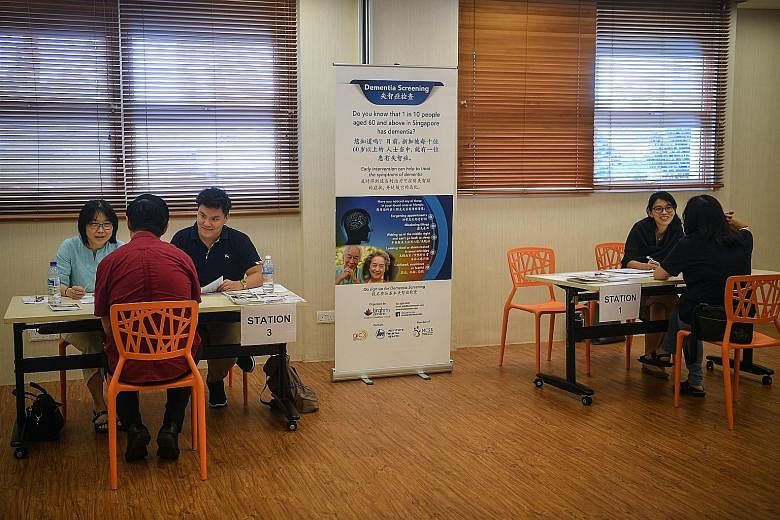There is no need to be screened for dementia if you are not showing any symptoms suggestive of it, say local authorities.
This comes even as a growing number of people are diagnosed with the brain disorder as the population ages, and plans for screening other conditions en masse get under way.
Come September, people can get tested for up to five common conditions, including diabetes and cervical cancer, at clinics islandwide. The aim is to allow for early intervention so as to prevent the onset of serious health complications and disability such as limb amputation, kidney failure, stroke and blindness.
A Ministry of Health (MOH) spokesman said: "The current evidence does not support community screening for dementia. This is because cognitive screening tools are not particularly sensitive, especially for identifying early stages of dementia. False positives could lead to unnecessary treatments while false negatives could lead to misleading assurance."
MOH was responding to queries from The Straits Times on community screening for dementia.
The Institute of Mental Health (IMH), as well as hospitals such as Changi General Hospital (CGH) and the National University Health System, have been training agencies in the community to do dementia screening. Last year, such agencies screened about 700 people for the condition in the central region of Singapore, up from 419 in 2016.
Brahm Centre, which started offering dementia screening late last year after receiving training from IMH, identified 35 people to be at risk of dementia or depression, out of the 305 people it saw.
Probable cases are referred to health institutions for formal diagnosis and treatment.
"We welcome anyone who is 60 years old and above, those who are concerned that they may have dementia or are showing symptoms of dementia, to come for screening," said Ms Angie Chew, executive director at Brahm Centre.
MOH said there is incomplete understanding of the natural progression of dementia, including how many individuals with Mild Cognitive Impairment (MCI) eventually progress to it. "Screening could therefore pick up more false positives and alarm individuals who may have MCI but not dementia," the spokesman said.
Singapore's approach is consistent with the recommendations of the US Preventive Services Task Force and the UK National Screening Committee.
Today, one in 10 people here aged 60 and above is diagnosed with dementia. It affects about 40,000 people here, and the number is expected to double by 2030.
MOH's recommendation is for evaluation of dementia to be carried out only when an individual has cognitive or behavioural complaints suggestive of it. Common signs include cognitive changes such as memory loss and disorientation, and personality changes such as depression and paranoia.
Dementia cases are detected in the community in various ways.
A spokesman for the Agency of Integrated Care, which works with community partners to identify and support such clients, said: "They can be identified by the community outreach teams at screening events or during home visits.
"General practitioners and polyclinics may also identify cases among their patients."
Those who opt to be screened for dementia in the community cite its affordability and convenience.
Madam Joanna Lim, 54, paid only $2 to have her mother screened for dementia at MacPherson Community Club in April by trained volunteers from Brahm Centre.
Her 85-year-old mother lived alone in a three-room flat a five-minute walk away. "It's good to have it in the community because elderly folks don't like to go to hospitals," said Madam Lim.
She had noticed that her mother was getting increasingly forgetful and was not eating or sleeping well.
Following a second screening at the community club done by CGH staff, her mother was found to have dementia and a hospital appointment has been booked.


